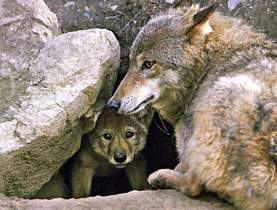Basel plans major aquarium

The hidden world of the oceans may soon be revealed in a huge marine aquarium planned by Switzerland’s oldest zoo.
Basel Zoo – known affectionately to locals as the “Zolli” – is looking to expand further into the city, by building what it calls an Ozeanium in an area of town which is ripe for renovation.
While such centres can be found in a number of countries, they are generally on the coast. There is nothing comparable within about 500km.
“Part of the point is that Basel isn’t on the coast,” admitted marine biologist Thomas Jermann, who is in charge of the project. But there’s also a slogan the town likes to use: ‘Basel is by the sea’, thanks to the Rhine which links us directly with the North Sea.”
So what lies behind the project? Apart from the fact that the zoo wants to expand, Basel wants to be able to show off large animals. Jermann already has something in mind, but he is saying nothing for the moment, other than that it is “a fantastic installation for the penguins, and something we’re not used to”.
“We already have 500 kinds of animal, but all of them are small, from coastal areas or from rivers. We don’t have the ocean to tell us the whole story.”
The zoo, like almost all similar institutions in Europe, wants to show and explain and to raise public awareness of the need to protect species and their natural environment. Like Zurich, it is doing this in the framework of various research programmes and international collaboration.
Hurdles
“The time is over when animals were simply exhibited to be looked at passively,” says Olivier Pagan, director of Basel Zoo.
“Some zoos go a bit more for spectacle, or to recreate a special atmosphere. Others, like us, aim above all for simplicity and closeness with the animals, but overall, they all have very professional methods for keeping animals.”
The Ozeanium project, presented by the Zoo in March, still faces a number of hurdles before it can be implemented – in five years’ time, if all goes well.
First of all, the cantonal parliament has to decide on a change in use of the Heuwaage area, which is next to the current zoo.
Unfortunately, the Natural History Museum – which belongs to the canton – has its eye on exactly to same spot for an expansion of its run-down premises.
Educational aim
The chairman of the cantonal government, Guy Morin, who is also culture minister, has said that – all things being equal – he would give preference to the zoo when it came to deciding about the future of the Heuwaage.
His decision, expressed in a government message about the area published at the end of June, raised some eyebrows.
“It is more logical to give the Ozeanium priority, because the site is right next to the zoo, and the museum has two sites already,” he explained.
But Morin has set out some conditions: the zoo must show that financing for both the construction and the management of the project are assured, and that there will be a strong educational message.
“Politicians are quite right to say there must be a message,” says Stéphane Hénard, co-founder of the Nausicaa Sea Life Centre in the French coastal town of Boulogne-sur-Mer. “In France and in the European Union, zoos are actually obliged to educate the public. Those who fail to do so may face penalties.”
“Visitors expect to learn something. In fact, that’s the very reason why they come at all. It would be suicidal not to opt for that. But that doesn’t stop us dreaming too.”
After being disappointed over the zoo’s project for a “polarium” in the old market hall a few years ago, when the site was allocated instead for purely commercial purposes, it seems that most people of Basel now back the Ozeanium. A support community has been formed on Facebook.
Worldwide efforts
Jermann says huge aquariums are mushrooming all over the world, especially in China, where several new centres open up every year. He rejects the view that this is simply a fashion.
“It’s a need rather than anything else,” he claims. “It’s been estimated that by 2050, 80 per cent of the world’s population will live on the coast, or at most 80km from the sea. We need to show how these natural resources can be used without destroying them, and also to demonstrate how nature uses them sustainably, and how we can imitate it – and it’s urgent!”
Basel Zoo intends to collaborate with other environmental protection organisations in planning its Ozeanium. Discussions are underway.
Ariane Gigon in Basel, swissinfo.ch (Adapted from French by Julia Slater)
Basel has the oldest zoo in Switzerland, and one of the oldest in Europe.
The “Zolli” opened in 1874. It was enlarged in 1939 and 1961.
It is known for its successful breeding programmes. It was the first zoo worldwide to breed the Indian rhinoceros; the first was born in 1956, and the 32nd was born in July 1010.
It was also the first zoo to breed greater flamingos, in 1959. In 2010 it achieved the largest number of chicks yet: 33, of which all but three survived.
In 2010, after nearly 10 years of efforts by specialists, the zoo hatched a rare pancake tortoise.
Basel Zoo was also in the headlines in 2010 when the oldest elephant in captivity, thought to be 59 years old, died of old age.
The vivarium with its aquariums, which opened in 1972, was the first to offer visits a theme trail.
In 2009, 1.7 million visitors came to see 6,611 animals of 659 species. (Zurich Zoo had 1.8 million visitors. It has 3906 animals of 368 species.)
The project is for a giant aquarium which would show “a fascinating hidden habitat which needs to be preserved”.
The cost has been set at between SFr70 and 100 million ($ ), to be financed from private sources.
It is hoped that the project will create jobs and increase tourism revenues.
The Natural History Museum, which needs either to move or to renovate its premises, is also planning a feasibility study for the same site.
The cantonal parliament may make a decision this autumn.

In compliance with the JTI standards
More: SWI swissinfo.ch certified by the Journalism Trust Initiative












You can find an overview of ongoing debates with our journalists here . Please join us!
If you want to start a conversation about a topic raised in this article or want to report factual errors, email us at english@swissinfo.ch.